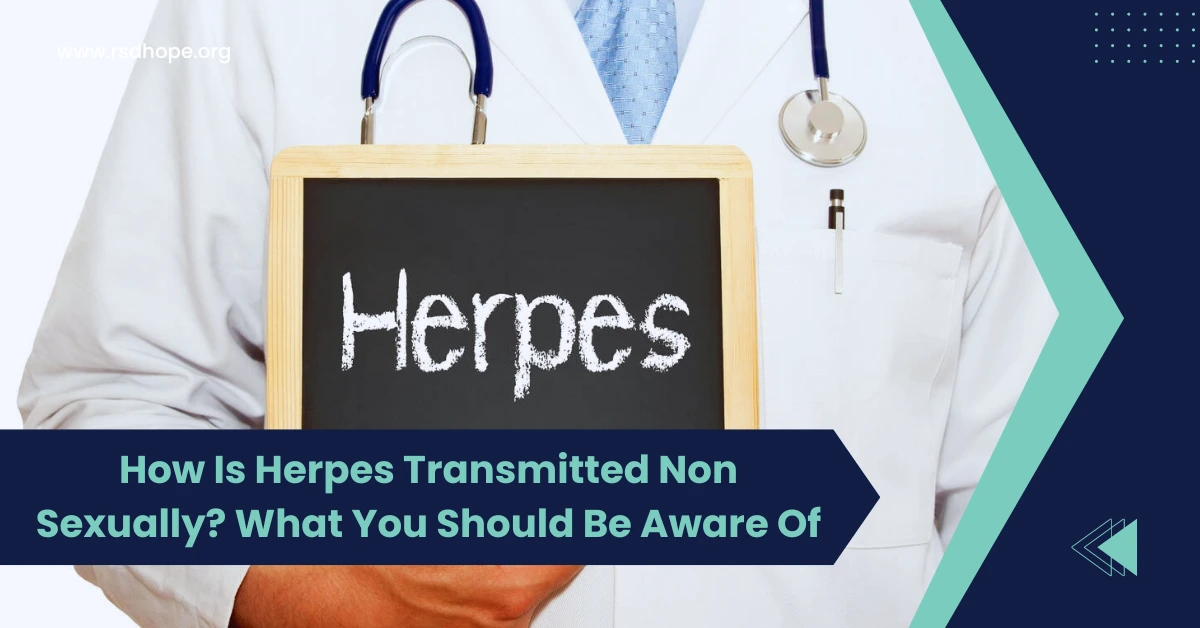Herpes is a highly prevalent viral infection that affects millions of people worldwide. While most people associate herpes with sexual transmission, it’s crucial to understand that the virus can also spread through non-sexual routes. In this blog post, we’ll explore how herpes is transmitted non-sexually, debunk common myths, and provide practical tips for prevention.
Key Takeaways
- Herpes can be transmitted through non-sexual contact, such as sharing utensils or touching infected areas.
- Practicing good hygiene and open communication are essential in preventing the spread of herpes.
- While herpes is a lifelong infection, it can be managed effectively with proper treatment and care.
Understanding Herpes
Herpes is caused by two types of viruses: herpes simplex virus type 1 (HSV-1) and herpes simplex virus type 2 (HSV-2). HSV-1 primarily causes oral herpes, characterized by cold sores or fever blisters around the mouth, while HSV-2 is mainly responsible for genital herpes. However, both types of viruses can infect either area of the body.
Symptoms of herpes include painful blisters or sores, itching, burning sensations, and flu-like symptoms. Healthcare professionals can diagnose herpes through visual examination, viral culture, or blood tests. If left untreated, herpes can lead to complications such as eye infections, meningitis, or neonatal herpes in newborns.
Also Read: What Does Royal Honey Do Sexually? Does It Boost Your Sexual Health?
How is Herpes Transmitted Non-Sexually
Contrary to popular belief, herpes can be transmitted through non-sexual contact. One common route of transmission is through sharing utensils, cups, or straws with someone who has an active oral herpes outbreak. The virus can also spread through kissing or touching an infected person’s skin, even if no visible sores are present.
Practicing good hygiene is crucial in preventing non-sexual transmission of herpes. Avoid sharing personal items like razors, towels, or lipstick, and wash your hands thoroughly after touching any potentially infected areas. It’s also essential to educate others about the risks of non-sexual transmission to reduce the stigma surrounding herpes.
Real-life examples of non-sexual herpes transmission include a case where a woman contracted oral herpes after sharing lipstick with her friend who had an active cold sore. Another instance involved a child who developed genital herpes after being bathed by a caregiver with an active herpes outbreak on their hand.
Is Herpes Curable?
Currently, there is no cure for herpes. Once a person contracts the virus, it remains in their body for life. However, antiviral medications can help manage symptoms, reduce the frequency and severity of outbreaks, and lower the risk of transmission to others.
Treatment options for herpes include oral antiviral drugs like acyclovir, valacyclovir, and famciclovir. These medications can be taken during an active outbreak or as daily suppressive therapy to prevent future outbreaks. Additionally, self-care measures such as keeping the affected area clean and dry, applying ice packs, and using over-the-counter pain relievers can help alleviate symptoms.
Preventing Herpes Transmission
Preventing herpes transmission involves a combination of practicing safe sex and maintaining good hygiene habits. Using condoms during sexual activity can reduce the risk of genital herpes transmission, but it does not provide complete protection as the virus can spread through skin-to-skin contact.
Open and honest communication with sexual partners about herpes status is essential. If you or your partner has herpes, it’s important to discuss the risks and take necessary precautions to prevent transmission. Abstaining from sexual activity during active outbreaks and considering suppressive therapy can further reduce the risk of spreading the virus.
In addition to sexual precautions, practicing good hygiene is crucial in preventing non-sexual transmission. Avoid touching active herpes lesions and wash your hands thoroughly if contact occurs. Disinfect any shared items or surfaces that may have come into contact with the virus.
Conclusion
Understanding how herpes is transmitted non-sexually is essential in dispelling myths and promoting awareness about this common viral infection. By practicing good hygiene, openly communicating with partners, and seeking medical advice when needed, individuals can effectively manage herpes and reduce the risk of transmission.
Remember, herpes is a highly prevalent condition, and having it does not define a person’s worth or character. With the right knowledge, care, and support, people with herpes can lead fulfilling lives and maintain healthy relationships.
Read More: Do Cold Showers Increase Testosterone? Examine The Science Behind It
FAQs
A: Yes, herpes can be transmitted even when no symptoms are present through asymptomatic shedding.
A: Yes, sharing drinks, utensils, or any items that come into contact with infected saliva can transmit oral herpes.
A: Yes, it’s important to have an open and honest conversation with your partner about your herpes status to prevent transmission and maintain trust in the relationship.
A: Yes, many people with genital herpes have healthy pregnancies and deliveries. However, it’s crucial to inform your healthcare provider about your herpes status to take necessary precautions and minimize the risk of transmitting the virus to the baby during delivery.
Sources:

